初中英语介词练习题及详解
初中英语介词题20套(带答案)含解析
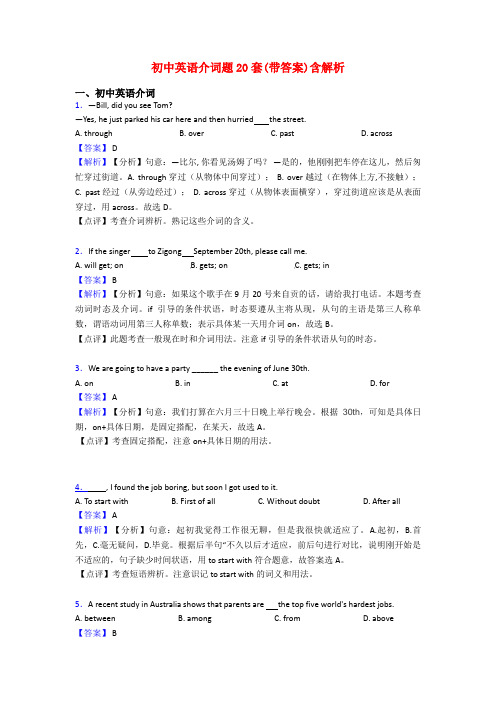
初中英语介词题20套(带答案)含解析一、初中英语介词1.—Bill, did you see Tom?—Yes, he just parked his car here and then hurried the street.A. throughB. overC. pastD. across【答案】 D【解析】【分析】句意:—比尔, 你看见汤姆了吗?—是的,他刚刚把车停在这儿,然后匆忙穿过街道。
A. through穿过(从物体中间穿过);B. over越过(在物体上方,不接触);C. past经过(从旁边经过);D. across穿过(从物体表面横穿),穿过街道应该是从表面穿过,用across。
故选D。
【点评】考查介词辨析。
熟记这些介词的含义。
2.If the singer to Zigong September 20th, please call me.A. will get; onB. gets; onC. gets; in【答案】 B【解析】【分析】句意:如果这个歌手在9月20号来自贡的话,请给我打电话。
本题考查动词时态及介词。
if 引导的条件状语,时态要遵从主将从现,从句的主语是第三人称单数,谓语动词用第三人称单数;表示具体某一天用介词on,故选B。
【点评】此题考查一般现在时和介词用法。
注意if引导的条件状语从句的时态。
3.We are going to have a party ______ the evening of June 30th.A. onB. inC. atD. for【答案】 A【解析】【分析】句意:我们打算在六月三十日晚上举行晚会。
根据30th,可知是具体日期,on+具体日期,是固定搭配,在某天,故选A。
【点评】考查固定搭配,注意on+具体日期的用法。
4. , I found the job boring, but soon I got used to it.A. To start withB. First of allC. Without doubtD. After all【答案】 A【解析】【分析】句意:起初我觉得工作很无聊,但是我很快就适应了。
完整版初中英语介词专项练习100例含答案

介词专练100题1.____ the age of ten, she had learned to play the piano.A.AfterB.InC.AtD.By2.The old man took a walk every day ____ when it rained.A.exceptB.besidesC.besideD.as3.Look at Lucy! How happy she looks ____ her new dress.A.after B.for C.atD.in4.His mother bought him a new bicycle ____ the morning of his eighteenth birthday. A.onB.inC.atD.before5.—The new dress looks very nice ____ you.—Thank you. I'm glad you say so.A.for B.atC.inD.on6.—How long have you been working in this factory?—_____ 1986.A.InB.FormC.AfterD.Since7.Japan lies ____ the east of Asia, _____ the east of China.A.in; toB.to; inC.in; inD.to; to8.The old lady _____ a pair of thick glass got on the bus.A.inB.havingC.with D.on9.The old woman died not ____ old age but ____ grief.A.from; fromB.of; ofC.of; from D.from; of10.He can speak two other foreign language well ____ English.A.exceptB.besidesC.besideD.except for11.Your composition is excellent, ____ some spelling mistakes.A.exceptB.besidesC.except forD.beside12.The young man was given a medal _____ what he had achieved in his research work. A.sinceB.because of C.because D.as13.Last summer we visited ____ beautiful places ____ Hangzhou, Huangshan and Nanjing. A.so; as B.such; like C.not as; as D.such; asI met Jim ____ the first time when I was in Harry's..14.A.at B.in C.for D.of15.Went for a walk in the forest ____ the moonlight.A.onB.inC.for D.by16.Which subject are you good ____, English or maths?A.onB.inC.ofD.at17.Did you see a girl ____ golden hair walk into the room?A.with B.ofC.has D.in18.____ the opinion of most people it is not good to eat too much meat.A.InB.For C.ToD.On19.It is the best answer ____ the question.A.ofB.about C.for D.to20.They found nothing ___ a stone in the parcel.A.besideB.but C.besidesD.like21.The fish with sharp teeth can eat a person ____ two minutes.A.after B.atC.for D.in22.____ the afternoon of June 18, we'll visit the school.A.InB.AtC.On D.By23.Some food and clothing will be supplied ____ the poor people in the mountain areas. A.for B.toC.atD.with24.He spent a large part of his salary _____ books.A.inB.onC.for D.at25.Sorry, I don't agree ____ your plan.A.toB.onC.about D.with26.There will be a party ____ New Year's Eve.A.onB.atC.for D.from27.I've been here ____ the year 1995.A.ever beforeB.ever sinceC.inD.during28.The Yellow River is the longest river ____ to the Changjiang River.A.next B.than C.toD.forGrapes can be made ____ wine..—29.—Is this bottle of wine made ____ grapes, too?—Sure. And it is made ____ China.A.into, of, for B.into, from, inDof, from, in.from, into, byC.30._____ my visit to Europe, I finally arrived ____ Italy.A.On, inB.On, atC.During, inD.In, at31.The doctor will be free ____ .A.10 minutes later B.after 10 minutesD .10 minutes afterC.in 10 minutes32.They will try their best to compete ___ a race ____ a prize.A.for, forB.in, forC.with, inD.in, in33.It doesn't seem useful ____ them to go on with the work.A.ofB.for C.toD.by34.It's really nice ____ you to come and see me.A.ofB.for C.toD.from35.The door closed ____ itself.A.for B.ofC.toD.in36.It was careless ____ him to drop his watch into the river.A.toB.with C.for D.of37.Since I came to China I've known that about seven people ____ ten speak Putonghua. A.ofB.toC.inD.about38.____ last month, Jack had been late for three times.A.By B.Since C.InD.For39.Let's walk over ____ the sun ____ the other side of the street.A.in, toB.to, on C.under, to D.by, at40.They went to school by bike ____ foot today.A.but B.instead of on C.but onD.instead of41.I knew nothing about the accident ____ what I read in the paper.A.but B.instead of on C.but onD.instead ofIt is not always east to tell right ____ wrong..42.A.or B.between C.and D.from43.We walked ____ Tian An Men square to the Monument ____ the People's Heroes. A.across, to B.across, of C.through, forD.past, to44.The boat is passing ____ the bridge.A.underB.through C.acrossD.towards45.They will leave a week ____ today. I do hope they can finish the work.A.fromB.onC.byD.for46.We need fifteen more people ____ our team to do the job.A.but B.exceptC.as wellD.besides47.I couldn't sleep well ____ all the windows open.A.when B.with C.for D.because of48.I recognized the handwriting _____.A.as our monitor B.like our monitorD.like that of my monitorC .as that of our monitor's49.Sports and games can be ____ great help to us. Let's all do more sports.A.ofB.with C.for D.in50.____ the two stories I've just read, I like the one written by the young lady better. A.InB.By C.OfD.From51.We planned to get to London ____ Monday, but I didn't arrive ____ Friday. A.on, onB.till, onC.to, from D.on, until52.The accident happened ____ a cold winter morning.A.inB.onC.for D.by53.About twenty percent of the population of our country live ____ wages.A.byB.onC.with D.in54.Your voice sounds different ____ the phone.A.inB.for C.from D.on55.The house is ____ fire; call ____ help quickly, or break the glass to sound the alarm. A.on, forB.at, forC.in, to D.on, to56.A new bridge will be built ____ the river.through.D over .C in.B by.A.57.Our National Flag stands out brightly ____ the blue sky.A.againstB.byC.under D.over58.Eating too much sweets and chocolates _____ meals is bad for you.A.amongB.through C.between D.for59.She looks quite young ____ her age.A.for B.ofC.inD.about60.I hope you can answer the paper ____ ink, not ____ pencil.A.at, withB.with, in a C.in, with a D.with, in61.The small village lies ____ the west of the river.A.atB.inC.from D.to62.The children are really hungry now, so we'd better find a restaurant to eat ____.A.atB.for C./ D.with63.The manager walked ____ the room, not knowing what to do with the workers. A.back and forth B.to and fromDup and down .backwards and forwardsC.64.Shall we make it a rule that no language ____ English should be spoken in an English Class.A.but B.besidesC.unlessD.like65.It is rude to make fun ____ the disabled.A.atB.about C.ofD.with66._____ the bad weather, we would have gone picnicking yesterday.A.In spite ofB.But forC.Because ofD.As for67.It's very kind ____ to help us ____ the harvest.A.of you; in B.for them; with C.of them; with D.for you; in68.They look _____ the way as the key _____ success.A.for; ofB.through; forC.on; to D.at; with69.It seems that he is always ____.A.in hurry B.in a hurry C.with a hurryD.with hurryGrapes are made ____ wine. That is to say, wine is made _____ grapes..70.A.of, into B.into, of C.from, from D.into, from71.The old couple went out for a walk every morning ____ when it rained.A.besidesB.except forC.exceptD.except that72.They used to live ____ 101 Heping Road, Tianjin.A.onB.atC.toD.of73.Can you imagine how excited my grandma was the first time she talked to me ____ telephone?A.onB.byC.over D.through74.Pop singers both at home and abroad are very popular ____ young people.A.byB.toC.with D.for75.—Why were you absent ____ school yesterday?—I was ill ____ bed.A.from, in B.to, on C.at, inD.in, on76.He introduced himself ____ Big John, but his real name is John Williams.A.toB.like C.asD.for77.As a housekeeper, ____ working, washing and sewing, she had to take care of four small Children.A.besideB.exceptC.except forD.besides78.____ everyone's surprise, the seven-year-old boy worked out the problem ____ no difficulty.A.To, with B.In, with C.To, in D.For, in79.The old men was ____ help, he is dying.A.without B.besideC.beyondD.against80.We offered him our congratulations ____ his achievements.A.atB.onC.for D.of81.It was a story ____ slum life(贫民窟)in Chicago.A.inB.about C.from D.of82.A steamer was going along ____ full speed, when it suddenly got into shallow water and ran aground.by.D with .C on.B at.A.83.John bought an expensive walkman ____ the money his father had given him.A.with B.byC.inD.through84.I knew nothing about it ____ he told me the other day.A.exceptB.except forC.except whatD.besides that85.The teacher together with ____ is going to see the film.A.usB.we C.our D.they86.Many new houses and tall buildings have been set up for teachers and it ____ an improvement of their conditions.A.has brought about B.has brought upD .C.has brought around has brought for87.In the march ____ the blazing (炙热)sands they experienced hunger, thirst and heat. A.through B.past C.crossD.across88.The bus stop is just across the street. It means ____.A.The bus stop is just on the other side of the street.B.The bus stop is just on the opposite side of the street.C.If you want to get to the bus stop, you must walk across the street.D.the bus stop is over there when you walk straight along the street.89.With her brown hair and blue eyes Jane seems to ____ her mother but in other ways she is more like her father.A.look after B.take after C.run after D.be after90.Not only did they plant many trees but also they took measures ____ tree diseases. A.for B.againstC.through D.to91.Some people became passive(not active) and stop working whenever anything ____ their wishes or wills.A.is against B.runs againstC.goes againstD.is for92.Ah. Margaret, come ____, the fruit shop is quite near. Just ____ the corner. A.along, behind B.across, around C.with, acrossD.along, around93.Try to be clam and sensitive ____ of danger.A.at the moment B.of the moment C.in the moment D.on the moment____ o the term, our form-teacher addressed us in an excellent speech. He impressed us a .94.lot.A.At the beginningB.In the beginningC.In the endD.At the middle95.He has a good head ____.A.by businessB.in businessC.for businessD.on business96.It happened to be very cold ____ the morning of our sports meet.A.atB.ofC.onD.with97.The table belongs ____ the corner.A.toB.inC.with D.on98.Tom was gentle and he often talked with others ____ a low voice but this time he shouted suddenly ____ the top of his voice.A.in, atB.at, inC.at, withD.in, with99.The policeman angrily seize the man ____ the collar, and asked him what he meant bysuch bad behaviour.A.byB.inC.with D.at100.They themselves take their work for granted, and do not care what strangers may think____ it.A.atB.about C.inD.with答案:1-5CADAD 6-10DACBB 11-15CBDCB 16-20 DAADB 21-25 DCBBA 26-30 ABABA 31-35 CBBAB 36-40 DCABB 41-45 CDAAA 46-50 ABACA 51-55 DBBDA 56-60 CACAC 61-65 DACAC 66-70 BCCBD 71-75 CBBCA 76-80 CDACB 81-85 BAACA 86-90 ADABB 91-95 ABCAC 96-100 C DAAB。
初中英语介词专项训练100(附答案)及解析
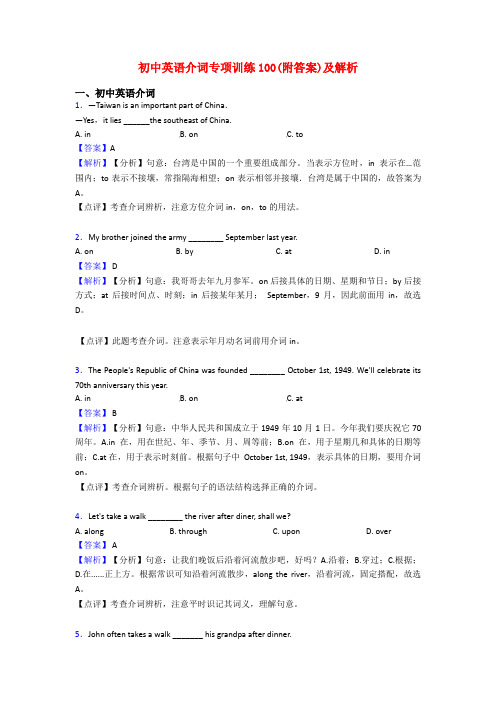
初中英语介词专项训练100(附答案)及解析一、初中英语介词1.—Taiwan is an important part of China.—Yes,it lies ______the southeast of China.A. inB. onC. to【答案】A【解析】【分析】句意:台湾是中国的一个重要组成部分。
当表示方位时,in表示在…范围内;to表示不接壤,常指隔海相望;on表示相邻并接壤.台湾是属于中国的,故答案为A。
【点评】考查介词辨析,注意方位介词in,on,to的用法。
2.My brother joined the army ________ September last year.A. onB. byC. atD. in【答案】 D【解析】【分析】句意:我哥哥去年九月参军。
on后接具体的日期、星期和节日;by后接方式;at后接时间点、时刻;in后接某年某月;September,9月,因此前面用in,故选D。
【点评】此题考查介词。
注意表示年月动名词前用介词in。
3.The People's Republic of China was founded ________ October 1st, 1949. We'll celebrate its 70th anniversary this year.A. inB. onC. at【答案】 B【解析】【分析】句意:中华人民共和国成立于1949年10月1日。
今年我们要庆祝它70周年。
A.in在,用在世纪、年、季节、月、周等前;B.on在,用于星期几和具体的日期等前;C.at在,用于表示时刻前。
根据句子中 October 1st, 1949,表示具体的日期,要用介词on。
【点评】考查介词辨析。
根据句子的语法结构选择正确的介词。
4.Let's take a walk ________ the river after diner, shall we?A. alongB. throughC. uponD. over【答案】 A【解析】【分析】句意:让我们晚饭后沿着河流散步吧,好吗?A.沿着;B.穿过;C.根据;D.在......正上方。
初中英语介词练习题&详解
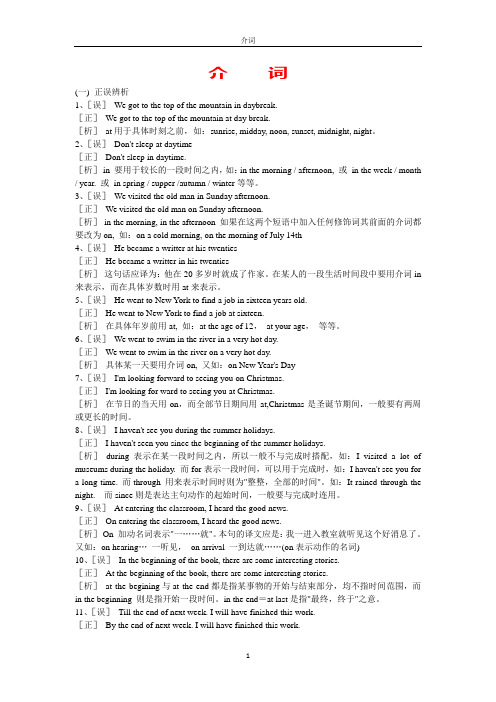
介词(一) 正误辨析1、[误]We got to the top of the mountain in daybreak.[正]We got to the top of the mountain at day break.[析]at用于具体时刻之前,如:sunrise, midday, noon, sunset, midnight, night。
2、[误]Don't sleep at daytime[正]Don't sleep in daytime.[析]in 要用于较长的一段时间之内,如:in the morning / afternoon, 或in the week / month / year. 或in spring / supper /autumn / winter等等。
3、[误]We visited the old man in Sunday afternoon.[正]We visited the old man on Sunday afternoon.[析]in the morning, in the afternoon 如果在这两个短语中加入任何修饰词其前面的介词都要改为on, 如:on a cold morning, on the morning of July 14th4、[误]He became a writter at his twenties[正]He became a writter in his twenties[析]这句话应译为:他在20多岁时就成了作家。
在某人的一段生活时间段中要用介词in 来表示,而在具体岁数时用at来表示。
5、[误]He went to New Y ork to find a job in sixteen years old.[正]He went to New Y ork to find a job at sixteen.[析]在具体年岁前用at, 如:at the age of 12,at your age,等等。
【初中英语】介词专项练习(附答案)
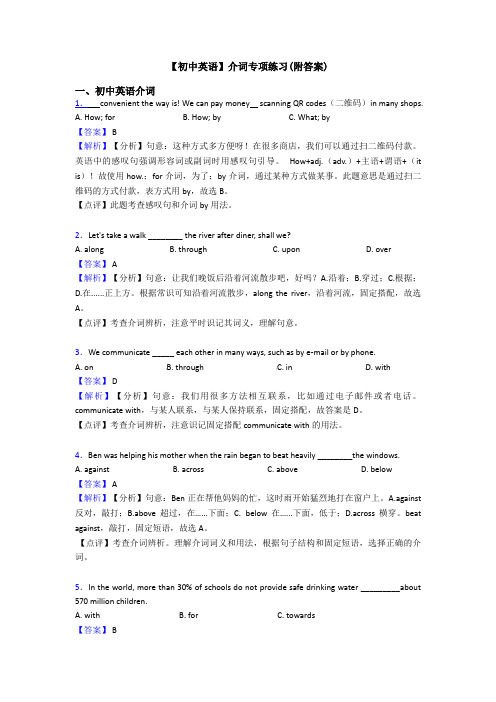
【初中英语】介词专项练习(附答案)一、初中英语介词1. convenient the way is! We can pay money scanning QR codes(二维码)in many shops.A. How; forB. How; byC. What; by【答案】 B【解析】【分析】句意:这种方式多方便呀!在很多商店,我们可以通过扫二维码付款。
英语中的感叹句强调形容词或副词时用感叹句引导。
How+adj.(adv.)+主语+谓语+(it is)!故使用how.;for介词,为了;by介词,通过某种方式做某事。
此题意思是通过扫二维码的方式付款,表方式用by,故选B。
【点评】此题考查感叹句和介词by用法。
2.Let's take a walk ________ the river after diner, shall we?A. alongB. throughC. uponD. over【答案】 A【解析】【分析】句意:让我们晚饭后沿着河流散步吧,好吗?A.沿着;B.穿过;C.根据;D.在......正上方。
根据常识可知沿着河流散步,along the river,沿着河流,固定搭配,故选A。
【点评】考查介词辨析,注意平时识记其词义,理解句意。
3.We communicate _____ each other in many ways, such as by e-mail or by phone.A. onB. throughC. inD. with【答案】 D【解析】【分析】句意:我们用很多方法相互联系,比如通过电子邮件或者电话。
communicate with,与某人联系,与某人保持联系,固定搭配,故答案是D。
【点评】考查介词辨析,注意识记固定搭配communicate with的用法。
4.Ben was helping his mother when the rain began to beat heavily ________the windows.A. againstB. acrossC. aboveD. below【答案】 A【解析】【分析】句意:Ben正在帮他妈妈的忙,这时雨开始猛烈地打在窗户上。
(英语)初中英语介词专题训练答案含解析

(英语)初中英语介词专题训练答案含解析一、初中英语介词1.I always play basketball to relax myself _______ Saturdays.A. onB. inC. atD. by【答案】A【解析】【分析】句意:我总是在周六打篮球来放松。
由句意可知,是指“在星期六”,在星期几的前面介词用on,故答案选A。
【点评】考查时间介词,注意in,on,at的用法。
2.—Do you have this T-shirt in a different color?—I'm afraid not. It only comes red.A. ofB. inC. for【答案】 B【解析】【分析】句意:——你有不同颜色的这件t恤吗?——恐怕没有。
只有红色。
根据T-shirt in a different color,可知是in+颜色,故选B。
【点评】考查介词辨析,注意辨别介词of、in和for 的用法。
3.On sunny days, my grandma often reads a novel ____ the window.A. byB. forC. withD. from【答案】 A【解析】【分析】句意:我奶奶经常在窗子旁边看小说。
by通过、被、在附近;for为、为了、对;with用、和……一起;from 来自,从……起,四者都是介词,根据句子结构可知此处是地点状语,by the window,在窗户旁边,故选A。
【点评】此题考查介词辨析。
根据句意确定句子中所使用的介词。
4.My English teacher always comes into the classroom ____a smile.A. byB. forC. onD. with【答案】 D【解析】【分析】句意:我英语老师总是带着微笑进入教室。
on "在……之上、在……时候";by "通过、被、由";for"为、为了、对";with "用、带着、和……一起",四者都是介词;表示老师面带微笑进入教室,用with,表伴随,故答案选D。
初中英语介词题20套(带答案)含解析

初中英语介词题20套(带答案)含解析一、初中英语介词1.The earth goes _____ the sun.A. aroundB. throughC. betweenD. across【答案】A【解析】【分析】句意:地球绕着太阳转。
A. around围绕、环绕;B. through穿过,表示从事物内部穿过;C. between在…两者之间;D. across横穿,表示从事物外部一边到另一边。
根据句意“地球绕着太阳转。
”go around表示绕着......转,故答案为A。
【点评】考查介词辨析。
掌握介词意义和一些固定搭配的用法。
2.—Is there ________ in today's morning news on CCTV-1?—Yes, France Team beat Korea Team by 4: 0 in the 8`h FIFA Women's World Cup in France ________ June 8, 2019.A. anything special; onB. something special; inC. special something; onD. anything special; in【答案】 A【解析】【分析】句意:——在央视一今日新闻里有特殊的事情吗?——是的。
法国队在2019年6月8日的法国第八届女子足球世界杯中以4:比0的成绩击败了韩国队。
复合不定代词+形容词,排除B、C。
问句是一般疑问句,所以用anything;on+几月几日,June 8 是几月几日,具体日期,所以用on,故选A。
【点评】考查复合不定代词及介词用法,注意平时识记,理解句意。
3.—Shall I help you ________ the street, Grandpa?—No, thanks. I can manage it myself.A. onB. withC. acrossD. along【答案】 C【解析】【分析】句意:——爷爷,我可以帮助你过马路吗?——不用,谢谢。
初中英语介词解题技巧讲解及练习题(含答案)含解析
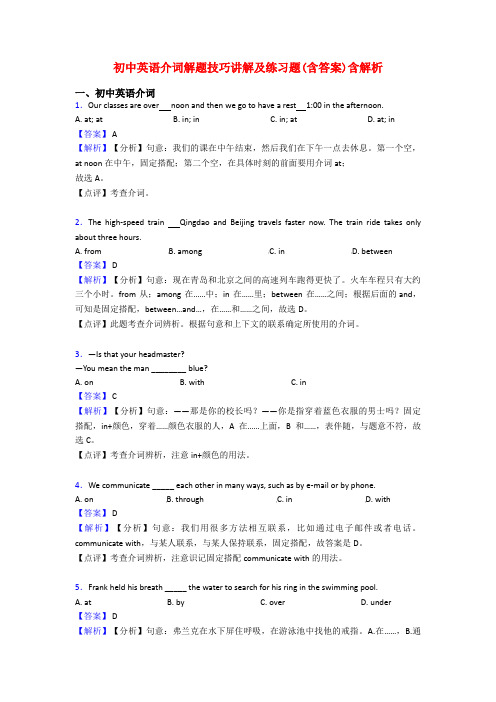
初中英语介词解题技巧讲解及练习题(含答案)含解析一、初中英语介词1.Our classes are over noon and then we go to have a rest 1:00 in the afternoon. A. at; at B. in; in C. in; at D. at; in【答案】 A【解析】【分析】句意:我们的课在中午结束,然后我们在下午一点去休息。
第一个空,at noon在中午,固定搭配;第二个空,在具体时刻的前面要用介词at;故选A。
【点评】考查介词。
2.The high-speed train Qingdao and Beijing travels faster now. The train ride takes only about three hours.A. fromB. amongC. inD. between【答案】 D【解析】【分析】句意:现在青岛和北京之间的高速列车跑得更快了。
火车车程只有大约三个小时。
from 从;among 在……中;in 在……里;between 在……之间;根据后面的and,可知是固定搭配,between…and…,在……和……之间,故选D。
【点评】此题考查介词辨析。
根据句意和上下文的联系确定所使用的介词。
3.—Is that your headmaster?—You mean the man ________ blue?A. onB. withC. in【答案】 C【解析】【分析】句意:——那是你的校长吗?——你是指穿着蓝色衣服的男士吗?固定搭配,in+颜色,穿着……颜色衣服的人,A 在……上面,B 和……,表伴随,与题意不符,故选C。
【点评】考查介词辨析,注意in+颜色的用法。
4.We communicate _____ each other in many ways, such as by e-mail or by phone.A. onB. throughC. inD. with【答案】 D【解析】【分析】句意:我们用很多方法相互联系,比如通过电子邮件或者电话。
- 1、下载文档前请自行甄别文档内容的完整性,平台不提供额外的编辑、内容补充、找答案等附加服务。
- 2、"仅部分预览"的文档,不可在线预览部分如存在完整性等问题,可反馈申请退款(可完整预览的文档不适用该条件!)。
- 3、如文档侵犯您的权益,请联系客服反馈,我们会尽快为您处理(人工客服工作时间:9:00-18:30)。
介词(一) 正误辨析1、[误]We got to the top of the mountain in daybreak.[正]We got to the top of the mountain at day break.[析]at用于具体时刻之前,如:sunrise, midday, noon, sunset, midnight, night。
2、[误]Don't sleep at daytime[正]Don't sleep in daytime.[析]in 要用于较长的一段时间之内,如:in the morning / afternoon, 或in the week / month / year. 或in spring / supper /autumn / winter等等。
3、[误]We visited the old man in Sunday afternoon.[正]We visited the old man on Sunday afternoon.[析]in the morning, in the afternoon 如果在这两个短语中加入任何修饰词其前面的介词都要改为on, 如:on a cold morning, on the morning of July 14th4、[误]He became a writter at his twenties[正]He became a writter in his twenties[析]这句话应译为:他在20多岁时就成了作家。
在某人的一段生活时间段中要用介词in来表示,而在具体岁数时用at来表示。
5、[误]He went to New York to find a job in sixteen years old.[正]He went to New York to find a job at sixteen.[析]在具体年岁前用at, 如:at the age of 12,at your age,等等。
6、[误]We went to swim in the river in a very hot day.[正]We went to swim in the river on a very hot day.[析]具体某一天要用介词on, 又如:on New Year's Day7、[误]I'm looking forward to seeing you on Christmas.[正]I'm looking for ward to seeing you at Christmas.[析]在节日的当天用on,而全部节日期间用at,Christmas是圣诞节期间,一般要有两周或更长的时间。
8、[误]I haven't see you during the summer holidays.[正]I haven't seen you since the beginning of the summer holidays.[析]during表示在某一段时间之内,所以一般不与完成时搭配,如:I visited a lot of museums during the holiday. 而for表示一段时间,可以用于完成时,如:I haven't see you for a long time. 而through 用来表示时间时则为"整整,全部的时间"。
如:It rained through the night.而since则是表达主句动作的起始时间,一般要与完成时连用。
9、[误]At entering the classroom, I heard the good news.[正]On entering the classroom, I heard the good news.[析]On 加动名词表示"一……就"。
本句的译文应是:我一进入教室就听见这个好消息了。
又如:on hearing… 一听见,on arrival 一到达就……(on表示动作的名词)10、[误]In the beginning of the book, there are some interesting stories.[正]At the beginning of the book, there are some interesting stories.[析]at the begining与at the end都是指某事物的开始与结束部分,均不指时间范围,而in the beginning 则是指开始一段时间。
in the end=at last是指"最终,终于"之意。
11、[误]Till the end of next week. I will have finished this work.[正]By the end of next week. I will have finished this work.[析]by 引起的时间状语表示了动作的截止点,其意思为"不迟于某一时刻将工作做完",所以主句一般是完成时态。
当然可以有将来时态,如:I'll be there by five o'clock.而till 则表达其一动作一直持续到某一时刻,但句中的动词一定要用持续性动词,而瞬间的截止性动词应用其否定句式,如:I won't finish this work till(until) next weekend.12、[误]He came to London before last weekend.[正]He had come to London before last weekend.[正]He came to London two weeks ago.[析]before 一般要与完成时连用,而ago则与一般过去时连用。
13、[误]I have studied English for three years gince I had come here.[正]I have studied English for three years since I came here.[析]since用来表达主句动作的开始时间,所以其引出的从句中应为过去时,而不能用完成时态14、[误]I can help you repair this bike. You will get it after two hours.[正]I can help you repair this bike. You will get it in two hours.[析]中文经常讲两小时之后来取,两天内会修好,而这个介词在英文中要用in而不要用after。
其原因有二,①after 多用于过去时,如:I arrived in New York. After three days, I found a job in the bank. ② after 加时间是表达一个不确定的时间范围,如:after three days, 即三天之后的哪一天都可以。
所以在许诺若干时间内会完成某事时,一定要用介词in。
15、[误]Three days after he died.[正]After three days he died.[正]Three days later he died.[析]after 与later都可以用来表达一段时间之后,但它们所处的位置不同,after 在时间词前,而later在时间词后。
16、[误]She hid herself after the tree.[正]She hid herself behind the tree.[析]after多用来表达某动作之后,所以有的语法书中称它为动态介词,如:I run after him. After finishing my homework, I went to see a film. 而behind则多用于静态事物之后。
17、[误]There is a beautiful bird on the tree.[正]There is a beautiful bird in the tree.[析]树上长出的果实,树叶要用on, 而其他外来的人、物体均要用in the tree. 18、[误]Shanghai is on the east of China.[正]Shanghai is in the east of China.[析]在表达地理位置时有3个介词:in, on, to。
in表示在某范围之内; on表示与某地区接壤;to则表示不相接。
如:Japan is to the east of China.19、[误]I arrived at New York on July 2nd.[正]I arrived in New York on July 2nd.[析]at用来表达较小的地方,而in用来表达较大的地方。
at常用于at the school gate, at home, at a bus stop, at the station, at the cinema, at a small village。
20、[误]He lived in No. 3 Beijing Road.[正]He lived at No. 3 Beijing Road.[析]在门牌号码前要用at, 并要注意它的惯用法:at the end of the street, at the foot of the mountain, at the top of the page。
21、[误]There is a colour TV set at the corner of the hall.[正]There is a colour TV set in the corner of the hall.[析]在屋内的角落应用in,而墙的外角用at,如:There is a tree at the corner of thestreet.22、[误]This weekend I'll stay in Uncle Wang's.[正]This weekend I'll stay at Uncle Wang's.[析]要注意英文的特殊表达法,如:at a tailor's shop (裁缝店)=at a tailor's, at the doctor's (去看病) at the bookseller's (在书店) at uncle Wang's (在王叔叔家)23、[误]Do you know there is some good news on today's newspaper?[正]Do you know there is some good news in today's newspaper?[析]在报纸上的新闻要用in, 而在具体某一版上,或某一页上则要用on。
